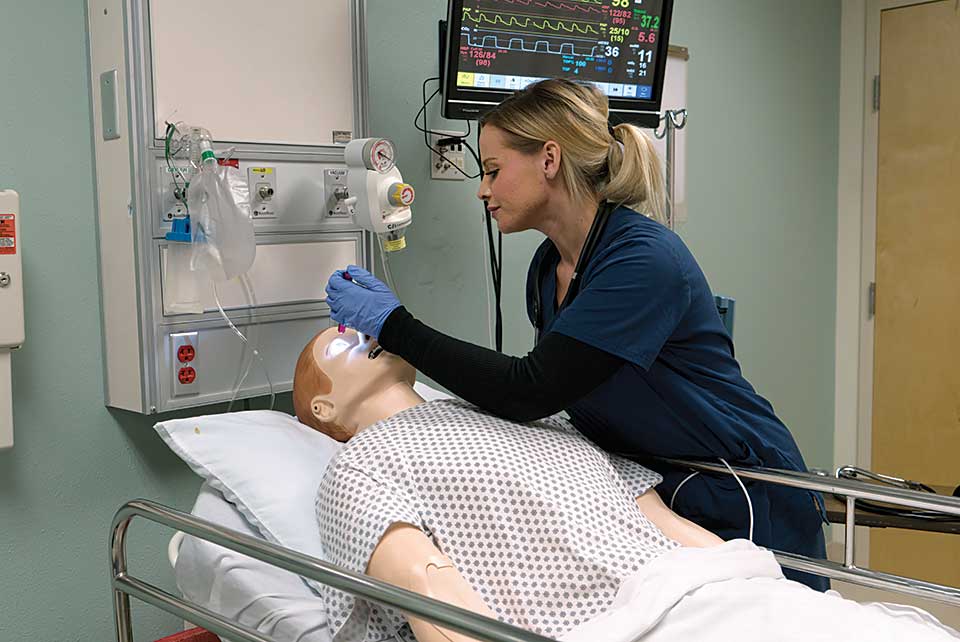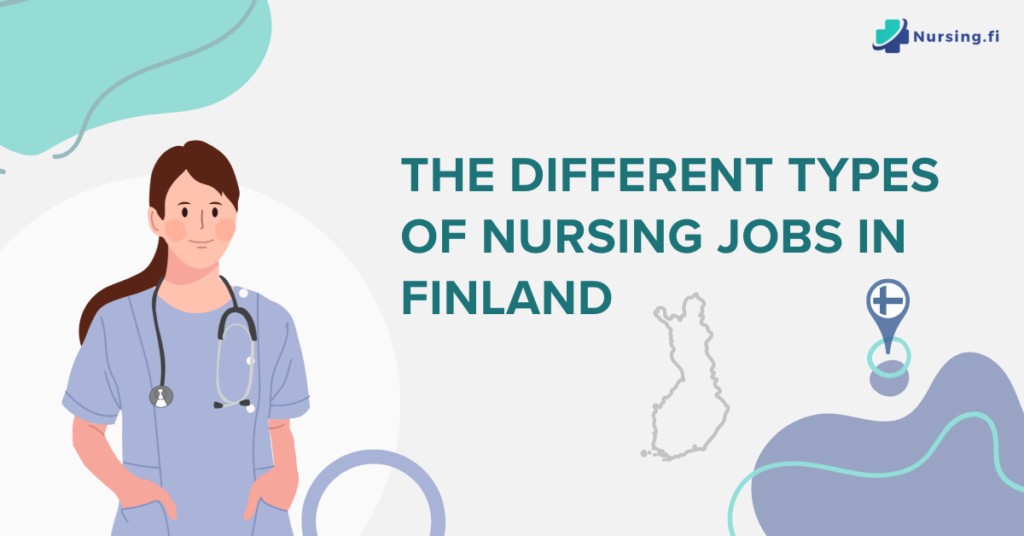The Different Types of Nursing Jobs in Finland
Nursing is a noble profession that plays a vital role in healthcare systems worldwide. Finland, known for its exceptional healthcare services and high-quality education, offers a wide array of nursing job opportunities. In this article, we will delve into the different types of nursing jobs in Finland, shedding light on the responsibilities, qualifications, and prospects associated with each.
Introduction
Nursing Jobs in Finland
Finland boasts a well-structured healthcare system, and nurses are a fundamental part of it. Let’s explore the various nursing specialties in Finland:
Registered Nurse (RN)

Responsibilities: Registered Nurses (RNs) in Finland have a broad range of responsibilities. They assess patients’ conditions, develop care plans, administer medications, and provide emotional support. RNs also collaborate with physicians and other healthcare professionals to ensure comprehensive patient care.
Qualifications: To become an RN in Finland, individuals must hold a Bachelor of Science in Nursing (BSN) degree, which typically takes three to four years to complete. Afterward, they must pass the national licensing exam to practice as an RN.
Licensed Practical Nurse (LPN)

Responsibilities: Licensed Practical Nurses (LPNs) provide essential nursing care, such as taking vital signs, dressing wounds, and assisting with daily activities like bathing and eating. They work closely with RNs and physicians to ensure patients receive proper care.
Qualifications: LPNs in Finland typically complete a diploma program in practical nursing, which takes approximately 1-2 years. They must also pass a licensing exam to practice.
Nurse Practitioner (NP)

Responsibilities: Nurse Practitioners (NPs) in Finland have advanced clinical training, allowing them to diagnose and treat a wide range of medical conditions. They can prescribe medications, order diagnostic tests, and provide primary care services. NPs often work independently in various healthcare settings.
Qualifications: NPs require a Master’s degree in nursing with specialization in advanced practice. They must also pass a national certification exam to practice as NPs.
Midwife

Responsibilities: Midwives specialize in caring for pregnant women throughout their pregnancy, labor, and postpartum period. They provide prenatal education, monitor fetal development, assist in childbirth, and offer postnatal care to both mother and baby.
Qualifications: To become a Midwife in Finland, individuals typically need a Bachelor’s degree in Midwifery. After completing their education, they must pass the national licensing exam.
Geriatric Nurse

Responsibilities: Geriatric Nurses focus on the unique healthcare needs of elderly patients. They assess and manage age-related health issues, administer medications, and provide emotional support in long-term care facilities, retirement homes, or home care settings.
Qualifications: Geriatric Nurses usually have a Bachelor’s degree in Nursing. They may also pursue additional training or certification in gerontology nursing.
Pediatric Nurse

Responsibilities: Pediatric Nurses specialize in caring for children from infancy to adolescence. They work in pediatric hospitals, clinics, or schools, providing specialized care, administering vaccinations, and supporting families during their children’s illnesses.
Qualifications: Pediatric Nurses typically hold a Bachelor’s degree in Nursing and may obtain additional certifications in pediatric nursing.
Psychiatric Nurse

Responsibilities: Psychiatric Nurses are trained to care for individuals with mental health disorders. They provide therapy, administer medications, and offer emotional support to patients in psychiatric hospitals, outpatient clinics, or community mental health centers.
Qualifications: Psychiatric Nurses typically hold a Bachelor’s degree in Nursing. They may also pursue additional training or certification in psychiatric nursing.
Operating Room Nurse

Responsibilities: Operating Room Nurses, also known as perioperative nurses, work in surgical settings. They ensure the operating room is sterile, prepare patients for surgery, assist surgeons during procedures, and monitor patients’ recovery in the post-anesthesia care unit.
Qualifications: Operating Room Nurses usually have a Bachelor’s degree in Nursing and may obtain additional certifications in perioperative nursing.
Critical Care Nurse

Responsibilities: Critical Care Nurses work in intensive care units (ICUs) and provide specialized care to critically ill patients. They monitor vital signs, administer life-saving treatments, and collaborate closely with other healthcare professionals.
Qualifications: Critical Care Nurses typically have a Bachelor’s degree in Nursing and may obtain certifications in critical care nursing.
Public Health Nurse

Responsibilities: Public Health Nurses focus on preventing illness and promoting community health. They work with communities, schools, and local agencies to educate the public, provide healthcare services, and conduct health screenings.
Qualifications: Public Health Nurses usually have a Bachelor’s degree in Nursing with a focus on public health. They may also pursue additional training or certifications in public health nursing.
Home Health Nurse

Responsibilities: Home Health Nurses provide medical care to patients in their homes. They help individuals with chronic illnesses manage their conditions, administer medications, and monitor their progress, allowing patients to receive care in a familiar environment.
Qualifications: Home Health Nurses typically have a Bachelor’s degree in Nursing and may receive additional training in home healthcare.
Oncology Nurse

Responsibilities: Oncology Nurses specialize in caring for cancer patients. They administer chemotherapy, monitor for side effects, and offer emotional support to patients and their families throughout their cancer journey.
Qualifications: Oncology Nurses usually have a Bachelor’s degree in Nursing and may obtain certifications in oncology nursing.
Travel Nurse

Responsibilities: Travel Nurses have the flexibility to work in various healthcare settings across Finland. They often fill temporary staffing gaps in different regions, providing essential nursing care where it is needed most.
Qualifications: Travel Nurses typically have a Bachelor’s degree in Nursing and may require additional certifications depending on the specialty they choose to work in.
Conclusion
The nursing profession in Finland is diverse and rewarding. Whether you aspire to work with children, the elderly, or in specialized fields like oncology or psychiatry, Finland offers a multitude of nursing job opportunities. The Finnish healthcare system’s commitment to quality care ensures that nursing professionals are valued and have a significant impact on patients’ lives.
FAQs
Are nursing qualifications from other countries recognized in Finland?
- Nursing qualifications from certain countries may be recognized in Finland, but it’s essential to verify eligibility with the Finnish authorities.
What is the average salary for nurses in Finland?
- Nurse salaries in Finland vary depending on the specialty and level of experience but generally range from €30,000 to €50,000 per year.
Is it difficult to find nursing jobs in Finland as a foreigner?
- It can be challenging for foreigners to secure nursing jobs in Finland, but it’s possible with the right qualifications and language skills.
What are the language requirements for nursing jobs in Finland?
- Finnish or Swedish language proficiency is often required for nursing jobs in Finland, as patient communication is crucial.
How can I become a registered nurse in Finland as an international student?
- International students can pursue nursing degrees in Finland by applying to universities offering English-language nursing programs.

